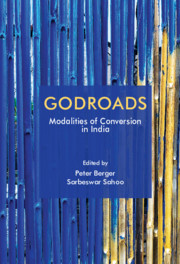Book contents
- Frontmatter
- Contents
- Foreword
- Acknowledgements
- Introduction
- 1 The Rise, Growth and Significance of Shudra Conversion Movements in the Methodist Mission, Hyderabad, 1925–1947
- 2 Communism and the Cross: A Caste–Class Trajectory of Religious Conversion in South India
- 3 Religious Conversion as Ethical Transformation: A Study of Islamic Reformism in Rural West Bengal
- 4 Conversion versus Unity: The Basel Mission among the Badaga on the Nilgiri Plateau, 1845–1915
- 5 Identity Change and the Construction of Difference: Colonial and Postcolonial Conversions among the Sumi Naga of Nagaland, Northeast India
- 6 Conversion to Christianity and Healing: The Naga of Northeast India
- 7 Reshaping the American Evangelical Conversion Narrative in Nineteenth-Century North India
- 8 Cultural Transformations through Performance Arts in Early Twentieth-Century South India
- 9 Reservation and Religious Freedom: Understanding Conversion and Hindu–Christian Conflict in Odisha and Rajasthan
- 10 Rupture and Resilience: Dynamics between a Hindu Reform Movement and an Indigenous Religion in Highland Odisha
- Afterword: India Seen from Amazonia
- About the Contributors
- Index
1 - The Rise, Growth and Significance of Shudra Conversion Movements in the Methodist Mission, Hyderabad, 1925–1947
Published online by Cambridge University Press: 24 April 2020
- Frontmatter
- Contents
- Foreword
- Acknowledgements
- Introduction
- 1 The Rise, Growth and Significance of Shudra Conversion Movements in the Methodist Mission, Hyderabad, 1925–1947
- 2 Communism and the Cross: A Caste–Class Trajectory of Religious Conversion in South India
- 3 Religious Conversion as Ethical Transformation: A Study of Islamic Reformism in Rural West Bengal
- 4 Conversion versus Unity: The Basel Mission among the Badaga on the Nilgiri Plateau, 1845–1915
- 5 Identity Change and the Construction of Difference: Colonial and Postcolonial Conversions among the Sumi Naga of Nagaland, Northeast India
- 6 Conversion to Christianity and Healing: The Naga of Northeast India
- 7 Reshaping the American Evangelical Conversion Narrative in Nineteenth-Century North India
- 8 Cultural Transformations through Performance Arts in Early Twentieth-Century South India
- 9 Reservation and Religious Freedom: Understanding Conversion and Hindu–Christian Conflict in Odisha and Rajasthan
- 10 Rupture and Resilience: Dynamics between a Hindu Reform Movement and an Indigenous Religion in Highland Odisha
- Afterword: India Seen from Amazonia
- About the Contributors
- Index
Summary
Any discussion of the nature of Shudra or other conversion movements towards Christianity in Hyderabad, or elsewhere, raises the question of what is meant by ‘a conversion movement’.
In line with the discussion of terminology in Christopher Harding's recent book, Religious Transformation in South Asia: The Meanings of Conversion in Colonial Punjab (2008), we intend to place the emphasis not on a movement normally involving some kind of dramatic or sudden type of emotional conversion experience among those involved (Bebbington 1989: 5–10) – though, in some cases, this may have occurred – but on the idea of an initial attraction to the movement, adherence and gradual transformation. This emphasis on a slower and less dramatic process coincides with many descriptions of the spread of Christianity in early modern Europe. It also reflects the language of C. G. Early, an experienced Methodist missionary based in Hyderabad, and a close observer of the Shudra's increasing involvement in Christianity, who referred to it, not as a ‘conversion’, but a ‘Christward’ movement.
While the idea of ‘conversion’ among evangelicals in Britain and the United States echoes St Paul's description of his own experience, implying a dramatic or sudden ‘turning’ from old ways to new, the turning, in the case of many new followers of Christianity in the Indian and Hyderabad context, was often a slow, gradual and unsteady process. As in the case of other missions, and under the supervision of Charles Posnett, who arrived in India in 1896 and became and remained the effective head of the mission until 1939 (Sackett 1951), baptism was regarded not as an end in itself, but as part of an ongoing process of changes in understanding, lifestyle and behaviour. This view closely accords with the editors’ description of ‘Godroads’ involving approaches to God, including ‘movement, change and transformation’ (see the editors’ introduction to this volume).
Enquirers (who were largely outcastes prior to the reception of the Shudra) were expected to learn and observe the basic precepts of Christian faith and conduct. After perhaps nine months or a year's preparation and teaching by a resident Indian pastor and his wife, those candidates asking for baptism were expected (amongst other things) to have learnt ‘passages of Scripture, the Lord’s Prayer, the Commandments, and some hymns of praise’ (Sackett 1926: ch. 3).
- Type
- Chapter
- Information
- GodroadsModalities of Conversion in India, pp. 47 - 67Publisher: Cambridge University PressPrint publication year: 2020



